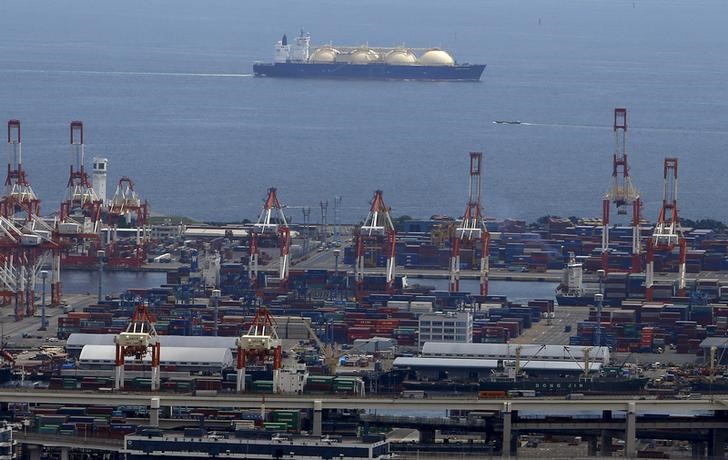By Osamu Tsukimori
CHIBA, Japan (Reuters) - Producers of liquefied natural gas (LNG), having shot themselves in the foot with oversupply, and facing calls for flexibility and greater competition from other fuels are taking on more risk and learning to trade, just like any other commodities dealers.
That's a big change for a market long dominated by large producers such as Royal Dutch Shell (L:RDSa) and BP (L:BP) which provide major importers with fixed volumes under multi-decade contracts linked to the price of oil (LCOc1).
Under the protection of these lucrative locked-in deals, producers in Australia, Qatar, Russia and elsewhere went on an investment spree that resulted in a huge supply overhang when demand in China and India developed more slowly than expected.
That, together with rising fuel competition from coal and renewables, contributed to a more than 70 percent crash in spot Asian LNG prices
"The LNG market is changing rapidly, (and) the large volume long-term contracts that traditionally underpinned the development of the industry are today much more difficult to obtain," said Steve Hill, executive vice president of Shell Eastern Trading, during a gas conference in Japan on Wednesday.
"LNG projects ... need to take more market risks," he said.
In a sign of what might be ahead, Japan's JERA - the biggest single importer of LNG - and France's Total (PA:TOTF) have signed a deal with flexible volumes, based entirely on spot prices, according to sources close to the matter.
Neither Total nor JERA responded to queries for comment.
Another thing about to change is that trading specialists - who buy commodities from producers to sell on to importers at a profit and who have so far played a smaller role in LNG than they do in oil or coal - are jumping into the game.
"People need to sit in the middle of the chain (to) provide the flexibility and meet the different customer needs," said Mike Utsler, chief operations officers for Australia's Woodside Petroleum (AX:WPL).
Preparing to do just that, commodity merchant Trafigura [TRAFG.UL] this week launched a standard master sales and purchase agreement (MSPA) for LNG trade, something already well established in other commodities.
UNLOCKING NEW MARKETS
Woodside, which operates several large LNG export facilities and is developing more, said producers also had to create new markets amid oversupply.
"There's a big opportunity for much smaller scale demand ... Big, long-term contracts are not necessary in order to supply (such projects)," Utsler said.
The thinking is similar at Shell. "We are trying to unlock new gas markets ... by initiating new small-scale LNG import terminals," Hill said.
Smaller scale demand could come from new importers like Pakistan, which only started using LNG in the last two years, or from new sectors like transportation.
Singapore's Pavilion Energy this week signed a memorandum of understanding with Total SA (PA:TOTF) to supply the French energy major with LNG used as a ship fuel.
But LNG producers need to mind competition. Oil still dominates transportation, and cheap coal - seen by many as outdated due to high pollution levels - is still the biggest fuel source for electricity, especially in fast-growing Asia.
Wind and solar energy are also becoming competitive.

"Coal won't completely disappear. It will continue to be a competitor and a provider of energy solutions, as will renewables," said David Knipe, head of international gas at BP's integrated supply and trading unit.